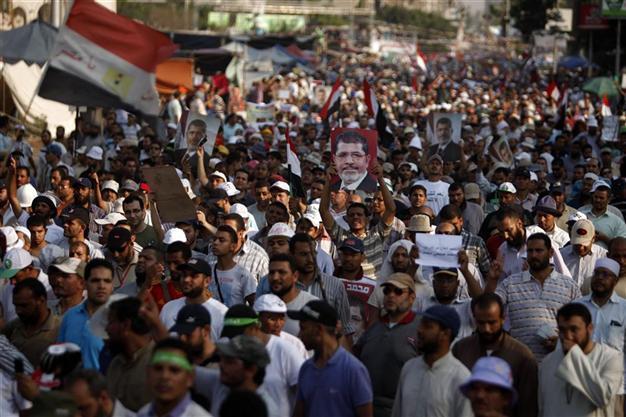Ankara in diplomacy to undo Egypt coup
ANKARA - Hürriyet Daily News

Supporters of deposed Egyptian President Mohamed Mursi attend a symbolic funeral for the four men killed during clashes with police outside the Republican Guard headquarters a day earlier, in Cairo July 6, 2013. Egypt counted its dead on Saturday after Islamists enraged by the overthrow of Mursi took to the streets in an explosion of violence against what they denounced as a military coup. REUTERS/Khaled Abdullah
Disappointed with the hesitant approach of its allies in the Western and Arab world in condemning the coup in Egypt, Turkey is continuing its efforts to push the international community to re-instate Mohammed Morsi as president of Egypt.Led by Prime Minister Recep Tayyip Erdoğan and Foreign Minister Ahmet Davutoğlu, Ankara’s diplomatic campaign includes the United Nations, the United States, the European Union and prominent Arab countries, such as Qatar.
“Our message is clear: Call this a coup,” a senior Foreign Ministry official told the Hürriyet Daily News yesterday. “Military coups are unacceptable, in Egypt or elsewhere. Undoing the coup and re-instating the toppled government should be the priorities of countries with a democratic understanding.”
For Turkey, establishing an interim government is meaningless and what should be done is to announce immediate elections with no restrictions on any political group, including the Muslim Brotherhood.
“Not underlining these points would be a very bad message to not only Egyptians but to those who are in search of democracy in other parts of the world,” a senior Foreign Ministry official told the Daily News yesterday.
Erdoğan called Ban Ki-moon, secretary-general of the U.N. late on July 6, following Davutoğlu’s intense phone diplomacy with his American and Qatari counterparts, John Kerry and Khalid al-Atiyya, respectively, as well as some other regional and European politicians over the weekend.
Turkey found itself alone in strongly condemning the Egyptian army’s ouster of Morsi as a coup d’état and calling on the Egyptian military to restore the democratically elected government with full power; its allies in the Arab world and in the West, however, either congratulated the army or preferred to use a milder language against the plotters.
Qatar, Saudi disappoint Turkey
Turkey’s deepest disappointment came from its prominent Arab allies, namely Saudi Arabia, Qatar and the United Arab Emirates, which were the frontrunners in congratulating the new transitional leadership and the army that conducted the coup.
“There is a serious disappointment with regard to their approach. We have made clear to them that this process in Egypt will be an important test for the Arab Spring. We hope they will revise their position and will adopt a similar line with ours,” the official said.
Turkey, Qatar and Saudi Arabia have been in close cooperation in efforts to topple the Bashar al-Assad government in Syria since mid-2011, in the latest chain of the Arab Spring movement. It remains unclear how developments in Egypt will affect ongoing international efforts to push a defiant al-Assad to agree to a political transition.
Erdoğan urges UN
Ban had echoed prominent international powers in defining the ousting of Morsi as “a military intervention” and in not making a strongly worded statement against the army.
Diplomatic sources told the Daily News that Ban represented the world’s most important institution and that his tone in condemning the coup was consequently very important.
“The U.N.’s condemnation would influence countries to react in the right direction or to change their stances for the good sake of democracy. The U.N. secretary-general has an ethical and moral mission,” a source said.
According to the statement issued by the Prime Minister’s Office, Erdoğan expressed his concerns over the suspension of the democratic process as a result of coup in Egypt and underlined the importance of immediately establishing civilian rule through elections.
US can use its influence on Egypt’s army
Davutoğlu and Kerry have exchanged at least three phone conversations since July 3, the first one before and the last two after the coup. Although the language Washington would use in condemning the coup in Egypt is very important, for Ankara, its influence over the Egyptian army is very vital in both preventing the street demonstrations from producing bloodshed and in starting a normalization process in the country. The arbitrary detentions of opponents or opening fire on civilians could cause unwanted scenes in the country, Ankara said.
Although Turkey, the U.S. and other prominent countries agree on the need to hand power back to civilian rule immediately, questions on how it will take place is also crucial for the Turkish government.
“We know perfectly that the position we are taking is carefully watched in Egypt and elsewhere. This position is also very important in terms of Turkey’s image in Egypt as well as of Turkey-Egypt bilateral ties,” the official said.
Will Turkey establish ties with the new government?
Given that Turkey had established strong cooperation with the Morsi government, there are questions as to whether Ankara will continue its ties with Cairo under any new government established by the military junta.
Officials, however, say their biggest priority is avoiding any bloodbath in the country.
“In the heat of the moment, our priority is to take steps with regard to these undemocratically unfolding developments. The coup is at a crossroads. Both parties have millions of people on the streets. And it’s been only three days since the coup,” the official said.
Turkish Ambassador Hüseyin Avni Botsalı will remain in his post for some time although his mandate ended and June 30, with Ahmet Yıldız set to replace him.
“We notified him just before the coup that his mandate was being extended. He is a very experienced diplomat and has close ties with all political camps,” the official said.
















